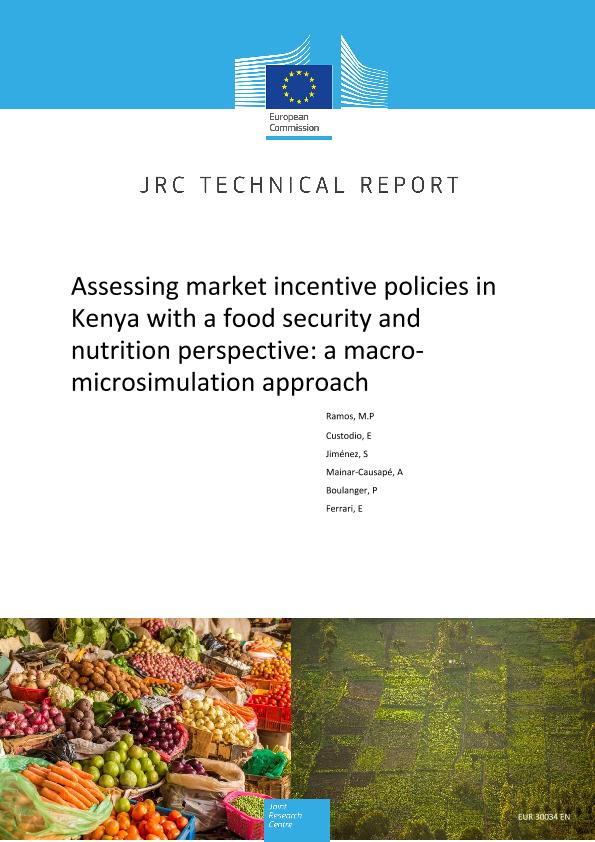Artículo
Assessing market incentive policies in Kenya with a food security and nutrition perspective: a macro-microsimulation approach
Ramos, Maria Priscila ; Custodio, Estefania; Jiménez Calvo, Sofía; Mainar Causapé, Alfredo; Boulanger, Pierre; Ferrari, Emanuele
; Custodio, Estefania; Jiménez Calvo, Sofía; Mainar Causapé, Alfredo; Boulanger, Pierre; Ferrari, Emanuele
 ; Custodio, Estefania; Jiménez Calvo, Sofía; Mainar Causapé, Alfredo; Boulanger, Pierre; Ferrari, Emanuele
; Custodio, Estefania; Jiménez Calvo, Sofía; Mainar Causapé, Alfredo; Boulanger, Pierre; Ferrari, Emanuele
Fecha de publicación:
04/2020
Editorial:
Publications Office of the European Union
Revista:
JRC Technical Report
e-ISSN:
1831-9424
Idioma:
Inglés
Tipo de recurso:
Artículo publicado
Clasificación temática:
Resumen
Kenya, such as other African countries, is particularly concerned about the achievement of the Sustainable Development Goal #2 (SDG #2: zero hunger), and its associated consequences for the society. Empirical evidence about food security and nutrition in Kenya accounts for deficiencies in food access, food sufficiency and food quality at the household level. These deficiencies are among others the causes of all forms of malnutrition (stunting, wasting and overweight), which can lead to cognitive impairment, limited immunity to diseases, low educational performance, increased risk of chronic disease and even mortality cases of children in this country. To solve the food security and nutrition problems in Kenya is a challenging issue because of the different dimensions to be tackled (economic, environmental, educational, health and sanitation) and also because of the heterogeneity that characterizes households (income and food expenditure, education level of households’ head, regional sanitation coverage, access to potable water / waste water system, etc.). In the recent past, the Government of Kenya supported the construction of a roughly €1.1 billion fertilizer plant in Eldoret in the framework of a fertilizer cost reduction strategy aiming at stabilizing fertilizer prices and making fertilizer more accessible through local manufacturing, blending and bulk procurement. Increasing the domestic production of fertilizers should reduce the price of fertilizer, making them more accessible for farmers. Co-authors of this report, employing the STatic Applied General Equilibrium for DEVelopment (STAGE-DEV) Computable General Equilibrium (CGE) model, calibrated on a Social Accounting Matrix Kenya 2014, evaluated the impact on food security of the creation of the fertiliser plant together with three additional policy scenarios (market access, extension and subsidies removal). For the purpose of this study, we developed a macro-micro simulation model, based on the previously developed CGE and policy scenarios and on microsimulations using the Kenya Integrated Household Budged Survey 2015/2016. The objective is to produce new set of food security indicators using macro-micro model linkages and it is purely methodological. The policy results, which should be taken with some caution, are discussed in terms of initial economic (per capita income), food security (household dietary diversity and dietary energy consumption) and children’s nutritional (stunting, wasting) status at the household level. Furthermore, national results are disaggregated by metropolitan areas (Nairobi and Mombasa) and the rest of urban and rural zones of the country. Main results suggest that increasing fertilizers’ availability coupled with increasing market access through the improvement of infrastructures and the reduction of transport costs (market access scenario) will increase overall purchasing power. Supporting pro-poor growth, this development will benefit the most those households with lower diet diversity and higher stunting rates. This policy scenario also leads to the largest increases in diet energy consumption, with similar distributive results as for the purchasing power impact. Increasing fertilizers’ availability paired with improving crops productivity in agricultural practices (extension scenario) leads to the largest increase in energy consumption, particularly from fats in the diet, among households with low diet diversity. Average protein and carbohydrate consumption at national level increase the most within the market access scenario. The results confirm the findings of the previous report. Increasing fertilizer availability in Kenya is not enough to improve food security in the country. The contribution of complementary policies, such as increasing the market access for fertilizers and agriculture by improving the rural infrastructure or improving the extension services to train small-holder farmers about fertilizer and land use, that give farmers better access to input and output markets is needed.
Archivos asociados
Licencia
Identificadores
Colecciones
Articulos(IIEP)
Articulos de INST. INTER. DE ECONOMIA POLITICA DE BUENOS AIRES
Articulos de INST. INTER. DE ECONOMIA POLITICA DE BUENOS AIRES
Citación
Ramos, Maria Priscila; Custodio, Estefania; Jiménez Calvo, Sofía; Mainar Causapé, Alfredo; Boulanger, Pierre; et al.; Assessing market incentive policies in Kenya with a food security and nutrition perspective: a macro-microsimulation approach; Publications Office of the European Union; JRC Technical Report; 2020; 4-2020; 3-48
Compartir
Altmétricas



